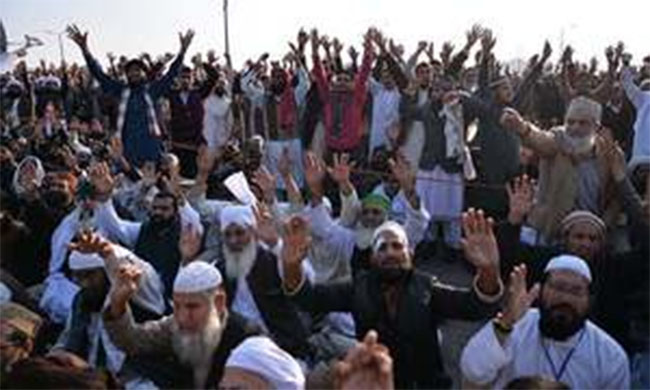Although democracy is debated hotly in modern world, democratic principles are violated to a great extent. People’s rights and dignity are infringed not only by militants but also by states, which are supposed to advocate democracy. In democratic states, citizens have the right to peaceful demonstration and government is not allowed to use force against demonstrators. However, a number of states seek to repress demonstrators through military force. There are reports about clashes between Pakistani police and demonstrators.
A protest broke out when Pakistan National Assembly passed the Elections Reforms Amendment Bill 2017, tabled by Law Minister Zahid Hamid, that amends the recently-passed Elections Act 2017 to restore a Khatm-i-Naboowat oath lawmakers are required, to take back to its original state. Through the Elections Act 2017, the words in Form-A “I solemnly swear” had been replaced with “I believe” in a clause. Tehreek-e-Labaik Pakistan started a protest and set a camp in Faizabad, Islamabad, demanding that the government identifies and punishes the responsible persons behind the recent change of wording in the declaration of Khatm-e-Nabuwat in election laws and the resignation of Law Minister Zahid Hamid over accusations of removing the clause.
Tehreek-e- Labaik Ya Rasool Allah (TLYR), an Islamist political party which is headed by Maulana Khadim Hussain Rizvi, opposed any changes in blasphemy law of Pakistan. The party demands Sharia law be established as law of Pakistan through a gradual legal and political process. Rizvi said his only goal was to see a stricter vision of Islam enshrined in the law of the land. Over disqualification of Nawaz Sharif, elections were held to elect new member for National Assembly of Pakistan from Constituency NA-120, so the party also participated in the election and secured third position.
Demonstrators have linked the change to blasphemy and claim the oath was softened to enable the participation of Ahmedis, a long-persecuted minority sect.
Subsequently, police launched an operation, on Saturday, using tear gas and water cannons to clear the area where Tehreek-e-Labaik protesters had camped out for the last 20 days as they have blocked the main route to Islamabad. According to reports, at least six people were killed and more than 125 people, including 80 members of the security forces, were wounded in Saturday’s crackdown when several thousand policemen and paramilitary forces tried to disperse the sit-in protest.
Furthermore, private TV channels, major social media platforms, Facebook and Twitter have been reportedly shut down on Saturday in Pakistan. It is being said that the decision has been taken as the Tehreek-e-Labaik is using the platforms to incite hatred in the aftermath of the Faizabad operation.
It should be noted that Tehreek-e-Labaik, similar to other political parties, has the right to launch peaceful demonstration, which is a democratic means for demanding government to meet citizens’ need. Warning demonstrators or punishing them is neither democratic nor effective. Since, Tehreek-e-Labaik is a political movement, negotiation would be the best solution to the issue. If Tehreek-e-Labaik is a radical party, what is it doing in National Assembly? But if it seeks to safeguard Islamic sharia in its true form, not in a radical way, the party should be given the chance to express its idea. Criticizing government or government officials is not a crime in democratic systems. So, punishing demonstrators is against democracy and a violation of citizens’ rights if it does not harmful to other citizens of a country.
To counter radicalism, Pakistani government must not let radical parties gain high position or seats in government’s machinery.
To institutionalize democracy, a country will have to respect the rights and freedoms of citizens and respond to their needs in a democratic manner. The Saturday’s military crackdown did not only fail to resolve the issue, but also fueled the fire of demonstrators. This reflects the fact that violence against citizens will make them lose their trust in the government.
Home » Opinion » Only Negotiation will Pour Oil on Troubled Waters
Only Negotiation will Pour Oil on Troubled Waters
| Hujjatullah Zia

